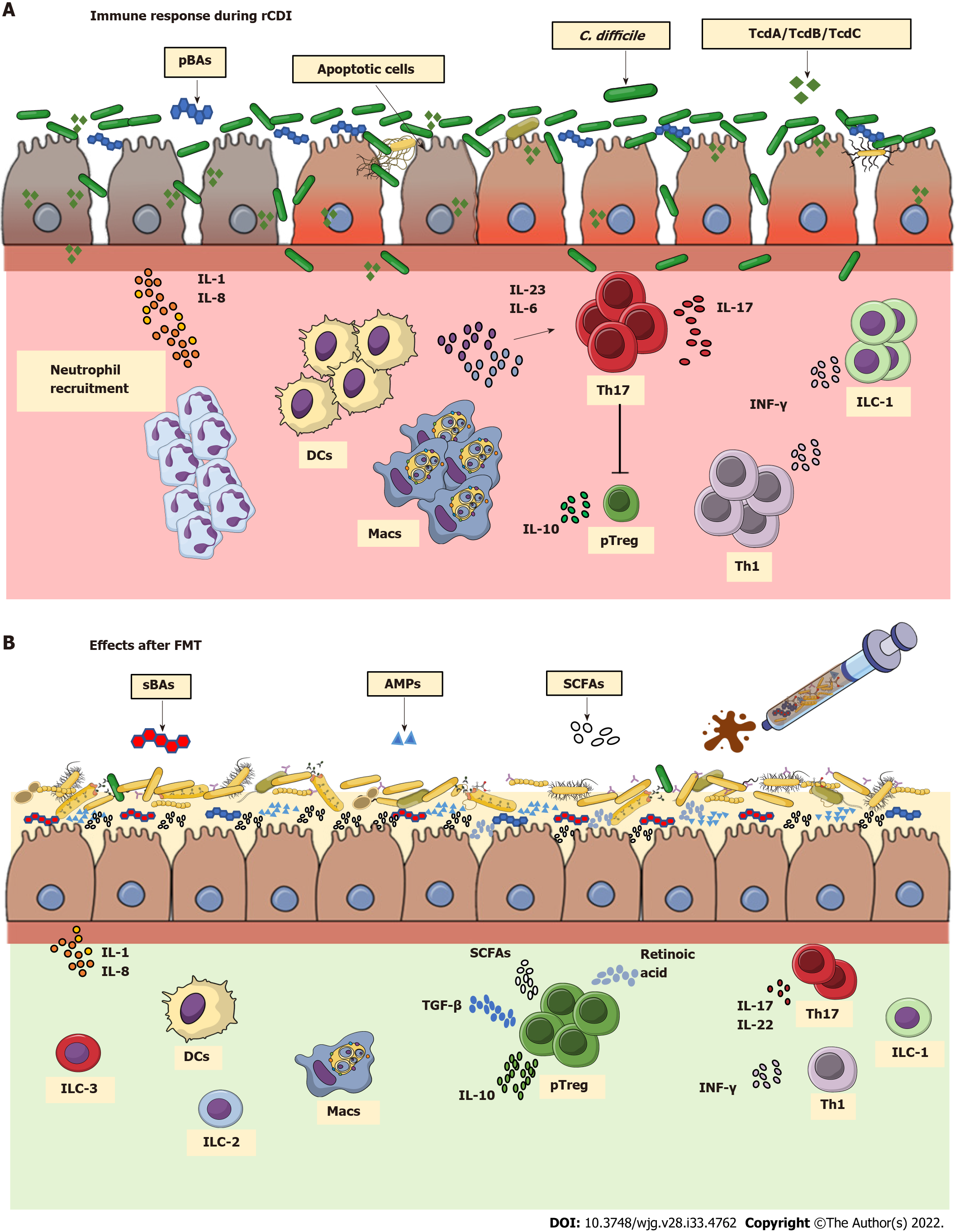Copyright
©The Author(s) 2022.
World J Gastroenterol. Sep 7, 2022; 28(33): 4762-4772
Published online Sep 7, 2022. doi: 10.3748/wjg.v28.i33.4762
Published online Sep 7, 2022. doi: 10.3748/wjg.v28.i33.4762
Figure 2 The immune response during recurrent Clostridioides difficile infection and after fecal microbiota transplantation treatment.
A: During recurrent Clostridioides difficile (C. difficile) infection, the depletion of commensal microbiota results in higher levels of primary bile acids (BAs). These molecules are known to trigger the C. difficile vegetative state and its expansion, resulting in production of toxin (Tcd) A, TcdB, and TcdC, which cause apoptosis of enterocytes and release of interleukin (IL)-1 and IL-8 in the lamina propria (LP). Consequently, there is extensive recruitment of neutrophils dendritic cells, and macrophages and type 1 innate lymphocytes (ILC-1) in an attempt to cope with the infection. These cells produce pro-inflammatory cytokines including IL-6, IL-23, interferon (IFN)-γ, which induce Th17 and Th1 differentiation. This inflammatory state dominated by IL-17 and IFN-γ promotes tissue damage, which could spread along the intestines, and is accompanied with absence of innate ILC-2 and reduction of peripheral T regulatory (Treg) cells; B: The therapeutic effects of FMT involve the reestablishment of a wide variety of commensal microorganisms that directly and indirectly antagonize C. diffcile. Commensal strains that produce secondary Bas and short chain fatty acids are re-established, as well as the production of antimicrobial peptides by epithelial cells together with the reconstitution of the barrier integrity. These effects allow to reduce the activation of innate immunocytes, the expansion of Treg cells which produce IL-10, and subsequent normalization of Th1 and Th17 cell frequencies in the LP. IL: Interleukin; FMT: Fecal microbiota transplantation; TNF: Tumor necrosis factor; INF: Interferon; SCFAs: Short-chain fatty acids; AMPs: Antimicrobial peptides; TGF: Transforming growth factor; pBAs: Primary bile acids; sBAs: Secondary bile acids; DCs: Dendritic cell; ILC: Innate lymphoid cells; rCDI: Recurrent Clostridioides difficile infection; Treg: T regulatory; Macs: Macrophages.
- Citation: Soveral LF, Korczaguin GG, Schmidt PS, Nunes IS, Fernandes C, Zárate-Bladés CR. Immunological mechanisms of fecal microbiota transplantation in recurrent Clostridioides difficile infection. World J Gastroenterol 2022; 28(33): 4762-4772
- URL: https://www.wjgnet.com/1007-9327/full/v28/i33/4762.htm
- DOI: https://dx.doi.org/10.3748/wjg.v28.i33.4762









